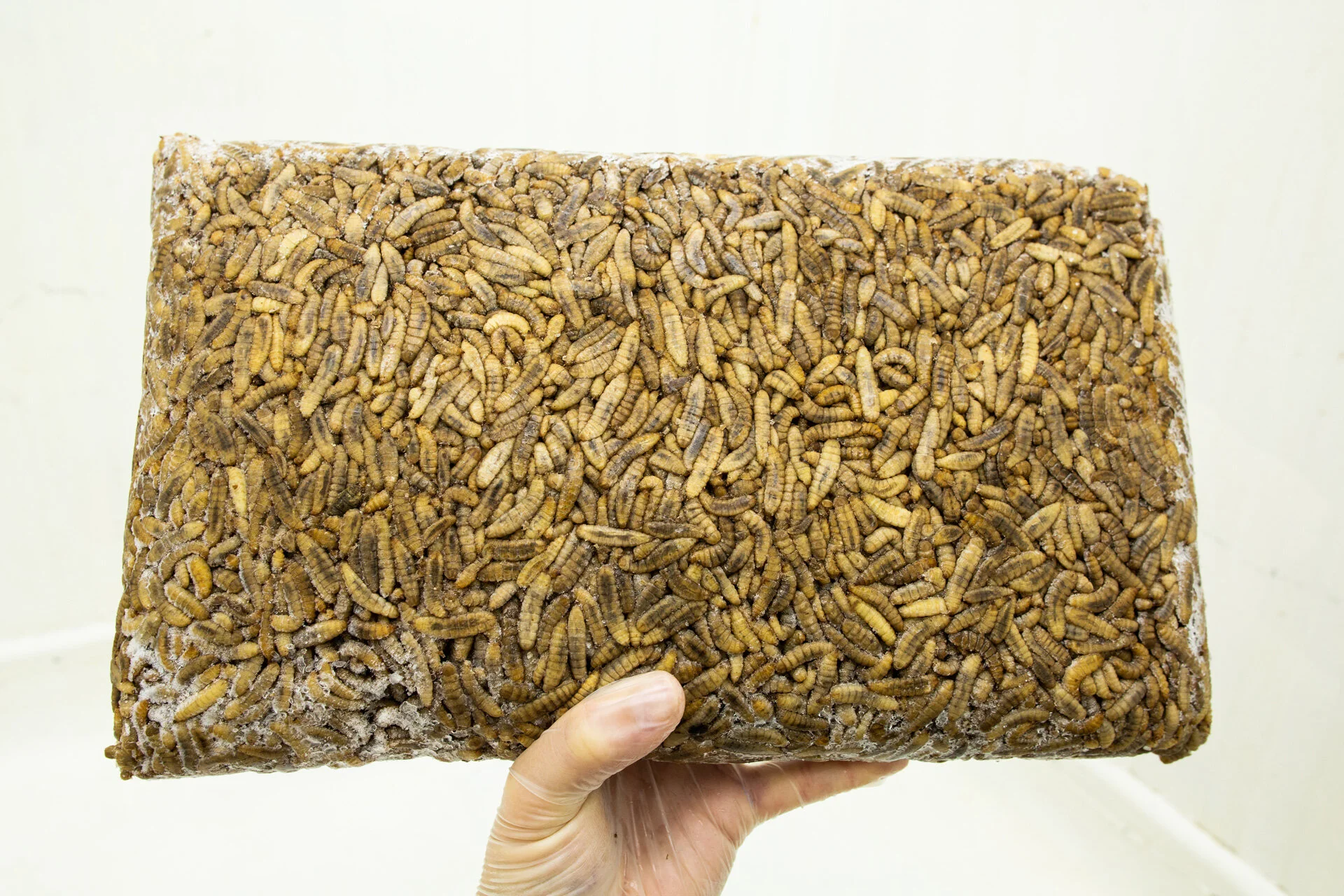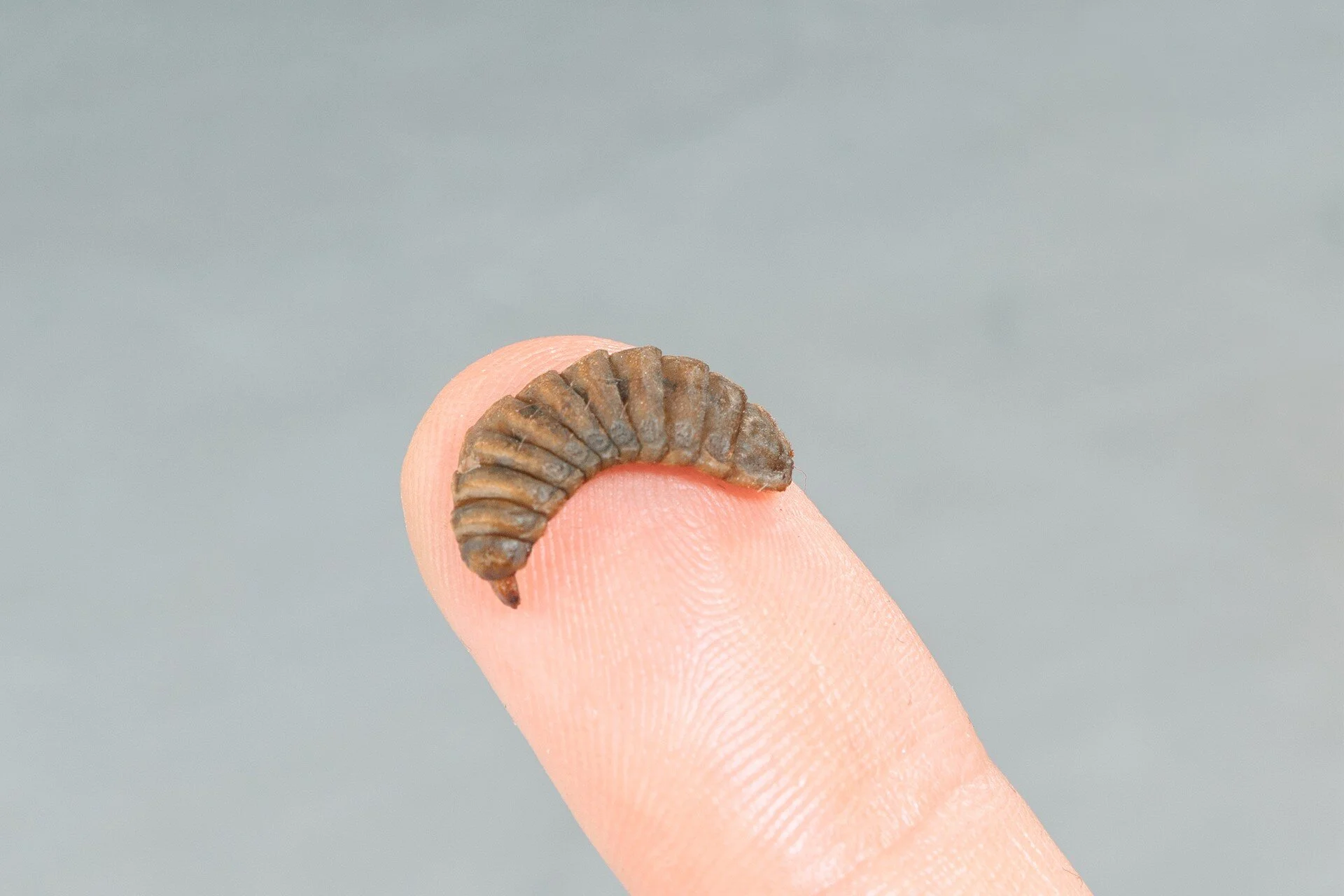Entocycle — for rethinking the food chain
Whole insect larvae. Credit: Entocycle.
The global food system is broken. Food production is responsible for one-quarter of the world’s greenhouse gas emissions. It’s often easy to look at its problems in an atomised way. Food waste for instance, or pinpointing meat and dairy as the problem. The truth is the issue is systemic. We have a highly optimised and complex supply chain that primarily values one thing: make it cheap and largely screw the planetary and societal consequences.
Here are five facts illustrating just some of the absurdities of how we currently produce food:
77% of agricultural land is used for farming animals, yet meat and dairy provide only 18% of the world’s calories. That seems a pretty poor ROI.
Farmed chickens and pigs are routinely fed fish — an animal they would never have naturally eaten in the wild.
69% of the EU’s protein-rich feed (e.g. soya) is imported.
40% of the UK’s 14.8m tonnes of food waste is sent to landfill each year releasing dangerous greenhouse gases.
99.4% less land is required to produce 1kg of protein from insects compared to soy - the main ingredient used to produce animal feed (Think of all that Amazon rainforest that could be saved)
Sounds pretty dysfunctional right?
Entocycle is a British insect farming startup that directly addresses ALL of these scary inefficiencies in our current food system. The company takes a ‘circular economy’ approach to production, it takes in pre-consumer food waste such as spent coffee grounds and beer grains and utilises insect’s natural bio-conversion process to convert this waste into natural, protein-rich insects to feed animals. The waste product from the process (the insect’s poop) is used as a highly effective and natural fertiliser that can be used to grow new crops. As in nature, there is no waste.
The 12-day conversion process uses a fraction of the land and water resource required to produce other forms of protein-rich food (meat) or feed (soy or fishmeal) and tackles food waste (what the insects are fed on) at the same time.
Black Soldier Fly larvae. Photo: Entocycle.
With an increasing spotlight on the environmental damage caused by unsustainable proteins, alternative proteins such as insect farming have become a rapidly growing industry. Entocycle’s rival Ÿnsect has raised $372m to build the world’s most high-tech insect farm in Amiens, France with plans to commercialise by supplying insects for the farmed fish and pet food markets. The global population is set to reach 9.7bn by 2050 and we’ll need new and sustainable ways to feed ourselves and what we eat.
What sets Entocycle apart from competitors is its development of computer vision models and automation that enables it to produce highly-predictable yields of black soldier fly larvae. The technology enables waste to be turned into food from anywhere in the world and produce protein all-year-round regardless of seasonality. Hyper-local feed production could mean the days of shipping protein half-way around the world are numbered.
The company’s ambition is to revolutionise the way we feed animals, replacing unsustainable protein sources such as soy and fishmeal with insects. It’s focusing initially on the UK pet food market helping forward-thinking and sustainably-minded businesses switch from meat to using more sustainable whole insects instead as a protein source. It’s estimated that meat-eating pets create 64 million tons of carbon dioxide each year — the same impact as a year’s worth of driving from 13.6 million cars.
The company has a pilot facility in London Bridge, central London, at the moment but a £10m UK government grant awarded from Innovate UK in September 2020 will enable the startup to start work building Britain’s first commercial insect farm in the latter half of 2021. It will be the first facility of its size in the UK and will start Britain’s journey to tackle the problem of food waste and become more food and feed secure, creating nutritious and sustainable animal feed within our own borders.
At the heart of Entoycle is the belief that humanity and nature are interconnected and we need a new-found understanding and respect of nature and its natural processes. Insects, for example, are nature’s natural nutrient recyclers and a natural source of food for many animals, yet these vital roles are undervalued or entirely missing from our current food system.
There could be other benefits of a new and profound respect for nature too.
“Viruses are kept in check in natural ecosystems with diverse and abundant wildlife,” says Keiran Whitaker, Entocycle’s founder and CEO. “But as humans encroach on nature, usually, to produce more food, we weaken these ecosystems and make them less resilient to disease. Our pushing of the natural world into ever tighter corners of the earth is what allows viruses to thrive. And this pandemic is the consequence.”
The health crisis has raised questions about how we live and the way society functions. Is society fair? Have we lost connection with nature? Challengers like Entocycle, that take a circular and holistic approach to preserving and utilising Earth’s precious resources could play a role in answering our desire for a better way as we rebuild. Much is at stake in 2021.






















